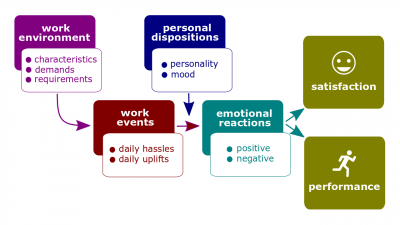Difference between revisions of "Affective events theory"
(Created page with "400px|thumb|right|[[Affective events theory]]Affective events theory (hereinafter, the ''Theory'') is a model that suggests that workplac...") |
|||
| Line 1: | Line 1: | ||
[[File:Affective-events.png|400px|thumb|right|[[Affective events theory]]]][[Affective events theory]] (hereinafter, the ''Theory'') is a [[model]] that suggests that workplace events cause emotional reactions on the part of employees, which then influence workplace attitudes and behaviors. | [[File:Affective-events.png|400px|thumb|right|[[Affective events theory]]]][[Affective events theory]] (hereinafter, the ''Theory'') is a [[model]] that suggests that workplace events cause emotional reactions on the part of employees, which then influence workplace attitudes and behaviors. | ||
| + | |||
| + | ==Definitions== | ||
| + | According to [[Organizational Behavior by Robbins and Judge (17th edition)]], | ||
| + | :[[Affective events theory]]. A [[model]] that suggests that workplace events cause emotional reactions on the part of employees, which then influence workplace attitudes and behaviors. | ||
==Related coursework== | ==Related coursework== | ||
Revision as of 05:00, 26 November 2018
Affective events theory (hereinafter, the Theory) is a model that suggests that workplace events cause emotional reactions on the part of employees, which then influence workplace attitudes and behaviors.
Definitions
According to Organizational Behavior by Robbins and Judge (17th edition),
- Affective events theory. A model that suggests that workplace events cause emotional reactions on the part of employees, which then influence workplace attitudes and behaviors.
